
RESOURCES
Truth-telling resources designed to provoke, challenge, and inspire action.

MYTH / FACT
Busting Common Misconceptions
Stop believing dangerous myths about cognitive loss. Discover what's actually true versus what society has led you to believe. Some of these revelations will challenge everything you've been told.
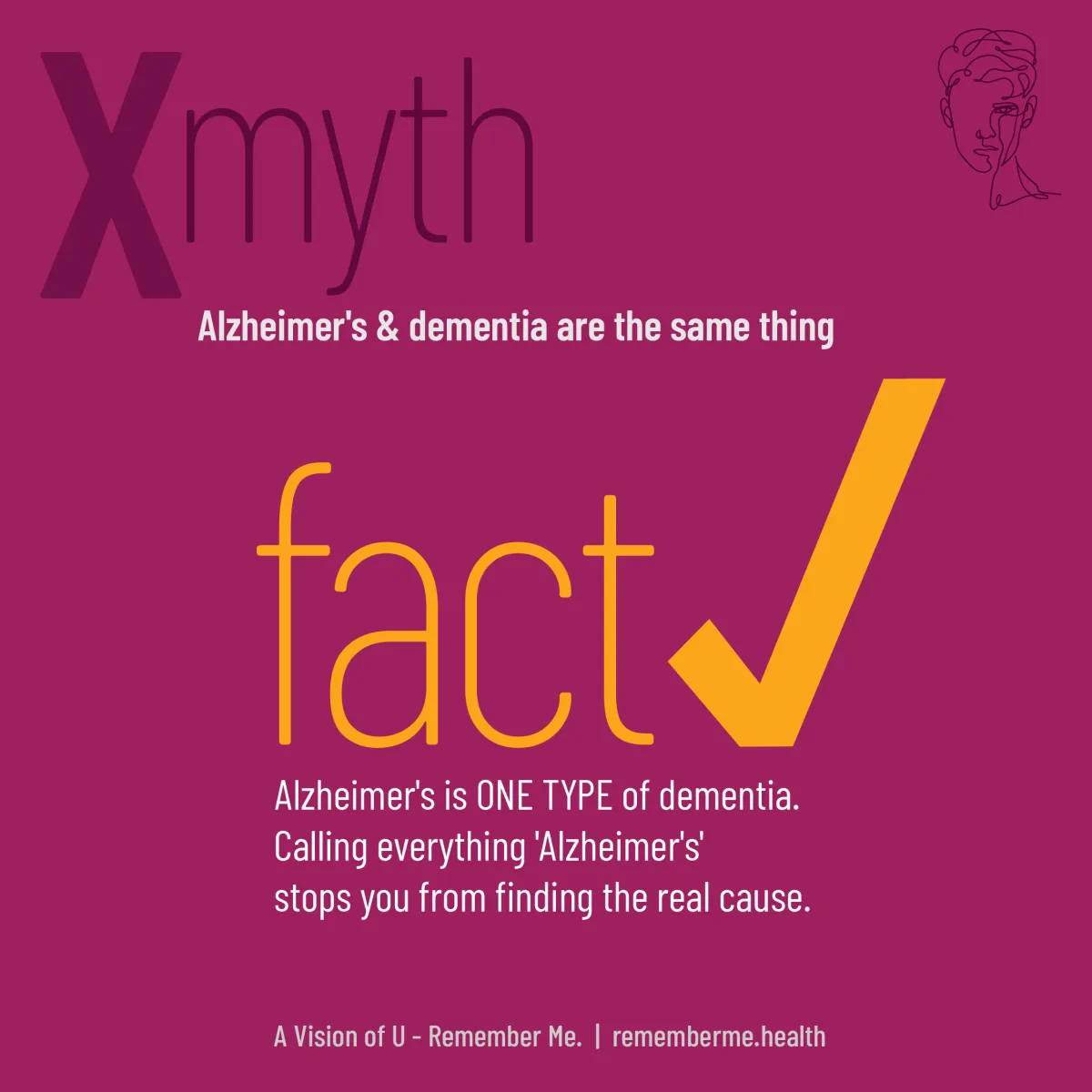
Myth: "Alzheimer's and dementia are the same thing"
Fact: "Alzheimer's is ONE TYPE of dementia. Calling everything 'Alzheimer's' stops you from finding the real cause."
"Calling all cognitive loss 'Alzheimer's' is like calling all cancers 'lung cancer.' It's lazy and dangerous."
Dementia is the umbrella. Alzheimer's, Vascular dementia, Lewy body, Frontotemporal - these are specific types under that umbrella. Each has different causes, different treatments, different outcomes. But you're so terrified of the word "Alzheimer's" that you never find out what you're actually dealing with. You can't fight an enemy you refuse to identify.
Do you actually know what TYPE of cognitive issues you're dealing with, or are you just saying "dementia" because you're scared to be specific?
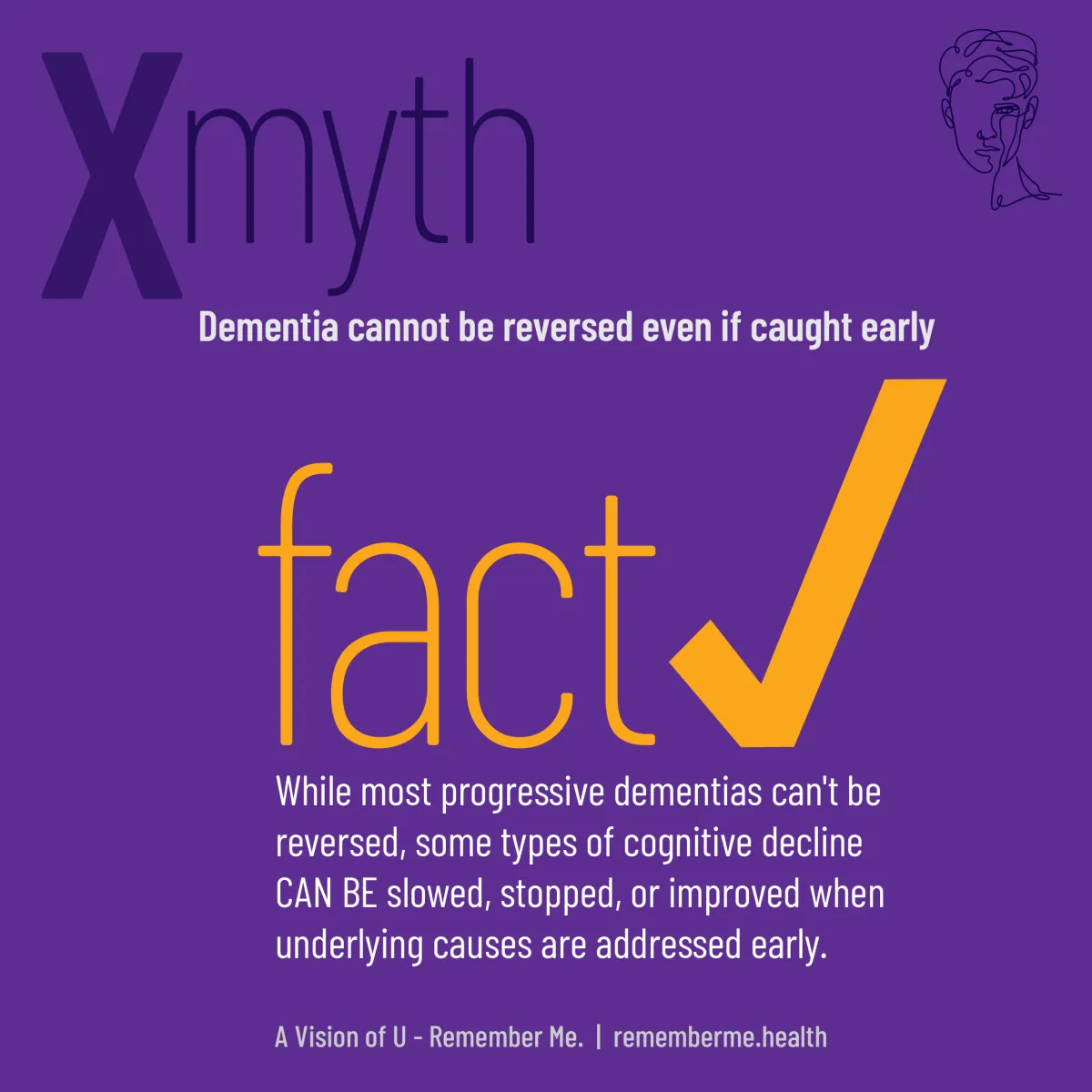
Myth: "Dementia cannot be reversed even if caught early"
Fact: "While most progressive dementias can't be reversed, some types of cognitive decline can be slowed, stopped, or improved when underlying causes are addressed early."
"The myth that 'nothing can be done' stops people from investigating treatable causes and pursuing interventions that can make a real difference."
This myth is dangerous because it prevents people from seeking help when early intervention matters most. While Alzheimer's and other neurodegenerative diseases currently can't be reversed, many cases of cognitive decline have treatable underlying causes: depression, vitamin deficiencies, medication effects, thyroid problems, sleep disorders.
Additionally, lifestyle interventions including nutrition, exercise, sleep optimization, and social engagement can slow progression and maintain function longer. Your brain deserves the chance to be properly evaluated and supported.
What would you do differently if you knew that comprehensive evaluation and early intervention could make a significant difference? Don't let hopelessness stop you from taking action.
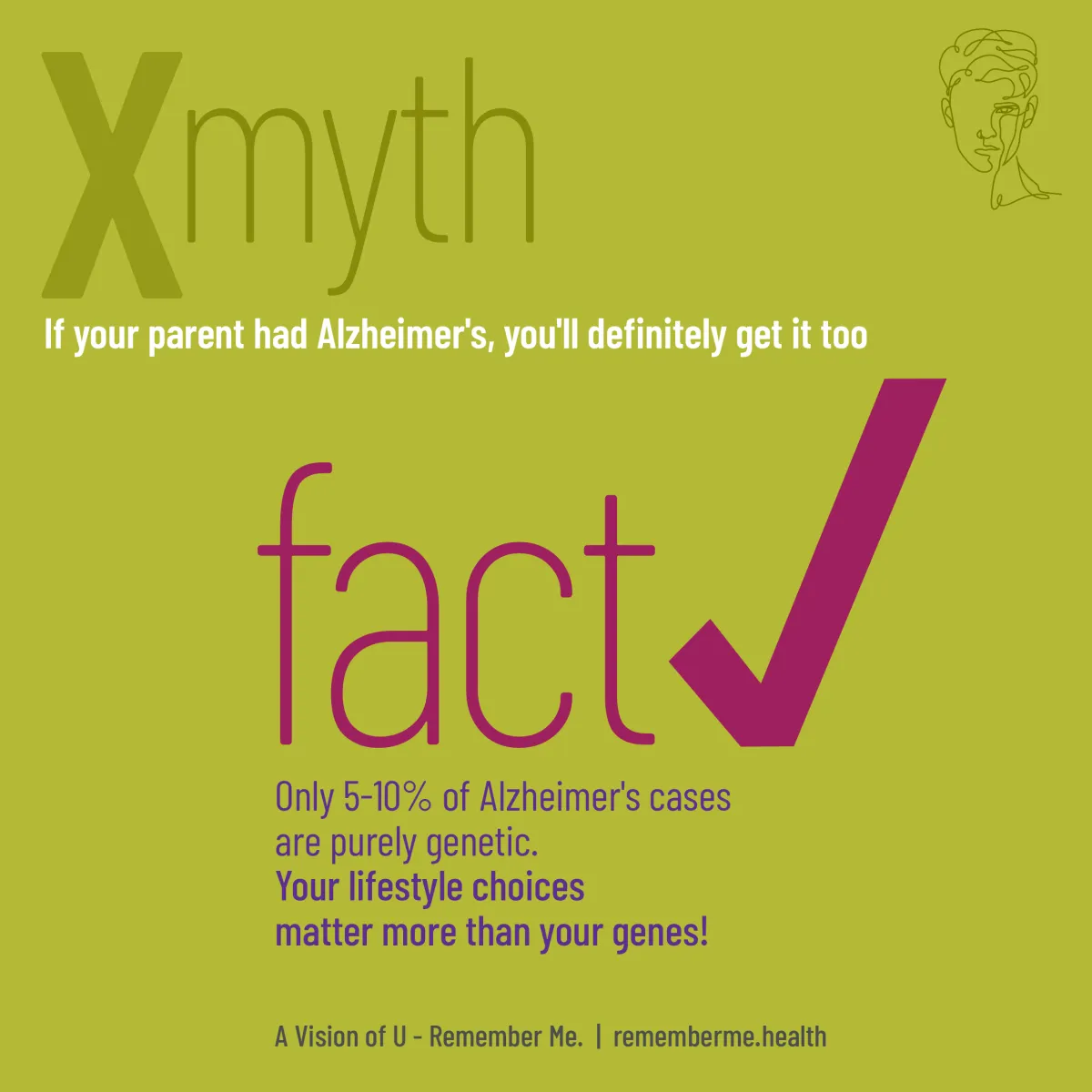
Myth: "If your parent had Alzheimer's, you'll definitely get it too"
Fact: "Only 5-10% of Alzheimer's cases are purely genetic. Your lifestyle choices matter more than your genes."
"You're using your family history as an excuse to give up before you even try."
Yes, genetics load the gun. But lifestyle pulls the trigger. You can have the genes and never develop the disease if you make different choices than your parents did. But instead of using your family history as motivation to do better, you're using it as an excuse to surrender. "It's genetic, so why bother?" That attitude guarantees you'll follow the same path.
Are you using your family history as motivation to do better, or as an excuse to give up? Which path are you on?
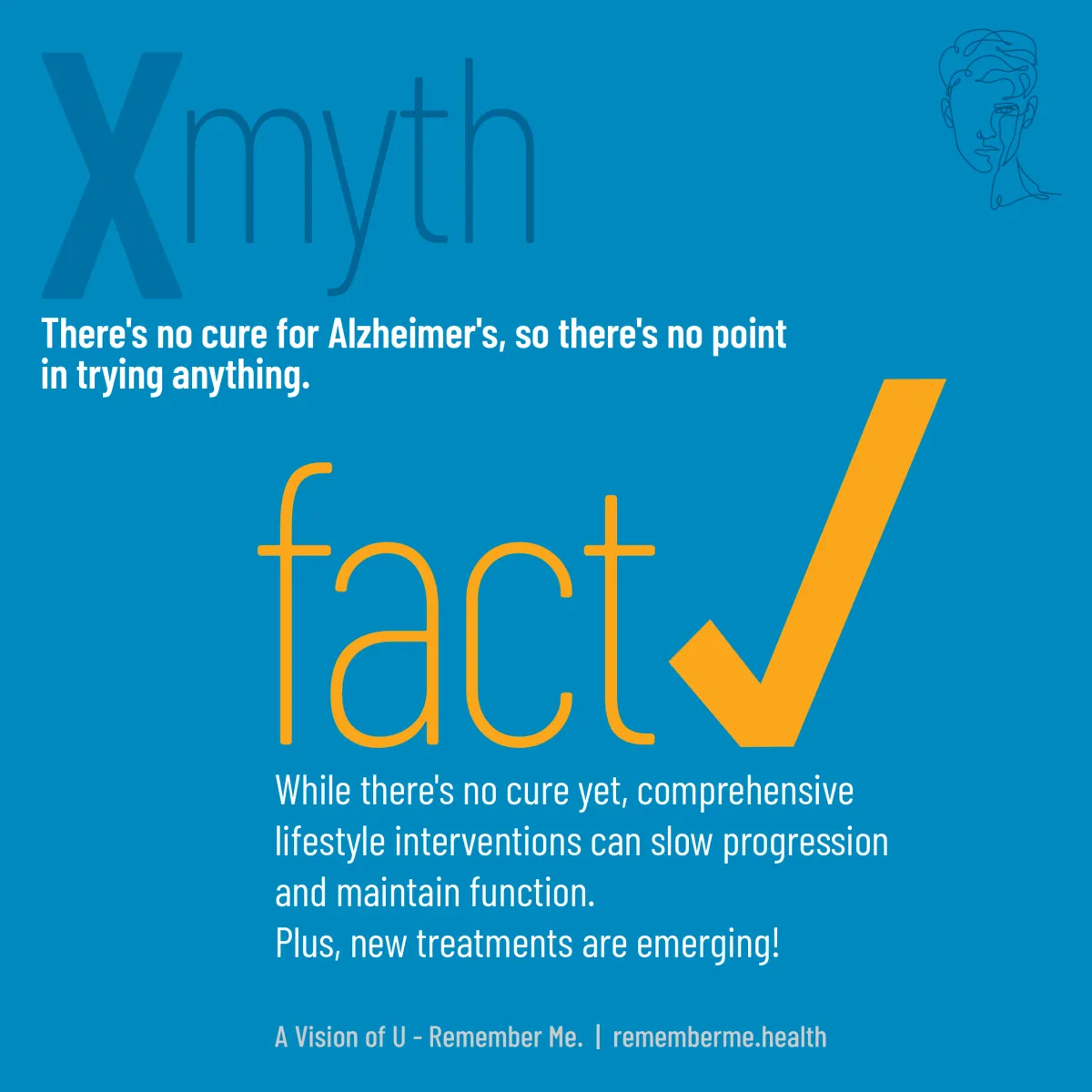
Myth: "There's no cure for Alzheimer's, so there's no point in trying anything"
Fact: "While there's no cure yet, comprehensive lifestyle interventions can slow progression and maintain function. Plus, new treatments are emerging."
"You're waiting for a magic pill while ignoring interventions that can slow decline and improve quality of life RIGHT NOW."
No cure doesn't mean no hope or no options. The new FDA-approved medications lecanemab and donanemab can slow progression in early-stage Alzheimer's. Comprehensive lifestyle approaches including exercise, nutrition, sleep optimization, and social engagement have shown benefits in clinical studies.
Early diagnosis and intervention matter because you have more brain function to protect. Your brain can't wait for someday cures when today's interventions can help maintain your cognitive abilities longer.
Are you actively using available interventions or passively waiting for a cure? What's your current strategy for protecting the brain function you have now?
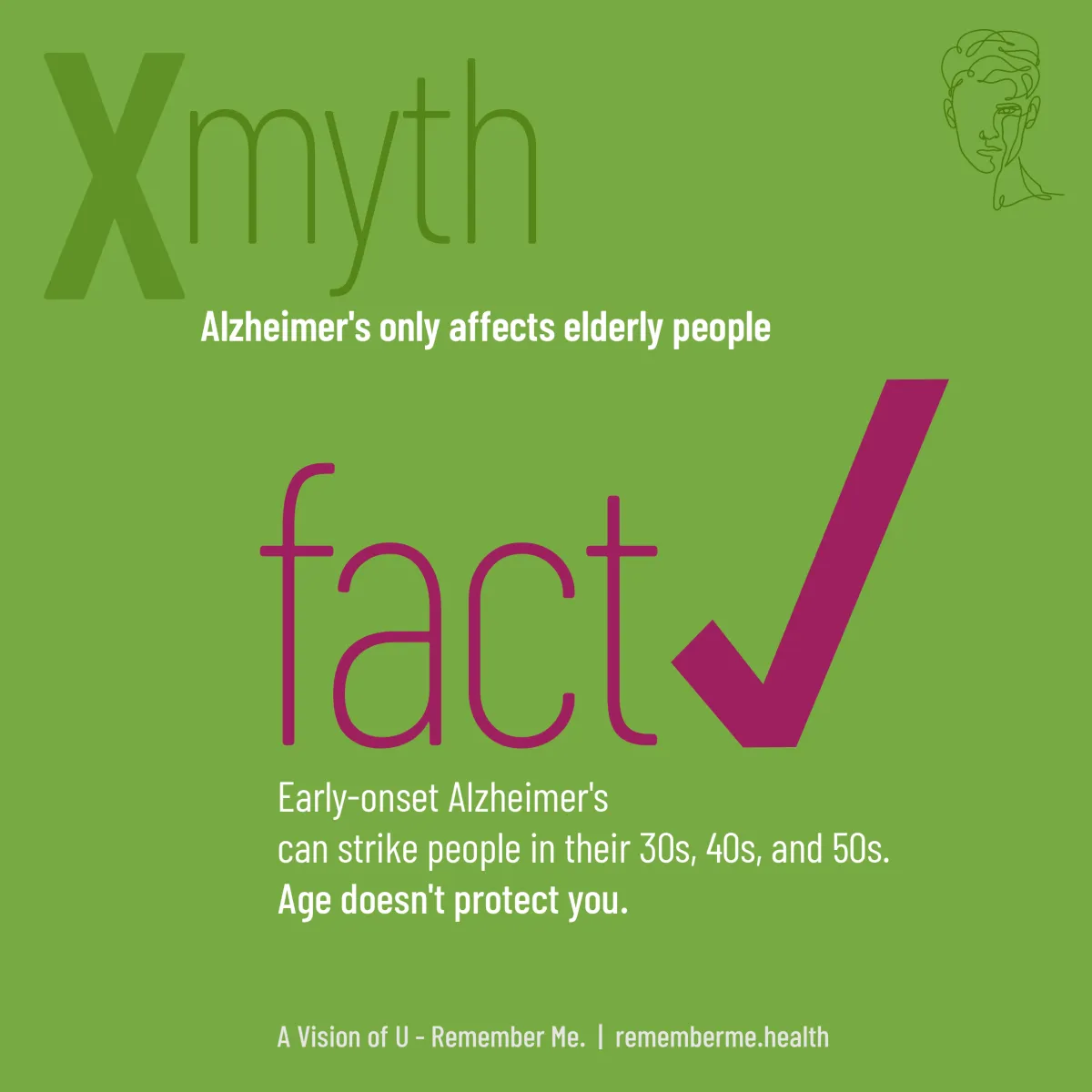
Myth: "Alzheimer's only affects elderly people"
Fact: "Early-onset Alzheimer's can strike people in their 30s, 40s, and 50s. Age doesn't protect you."
"Thinking you're 'too young' for cognitive decline is the deadliest form of denial."
Early-onset Alzheimer's affects 200,000+ Americans under 65. Some cases begin in the 30s. Frontotemporal dementia typically hits people in their 40s and 50s. But you think age protects you, so you ignore warning signs, delay prevention, and assume you have decades before this matters. Your brain doesn't check your birth certificate before developing problems.
How old were you when you started taking brain health seriously? If you haven't started yet, what are you waiting for?
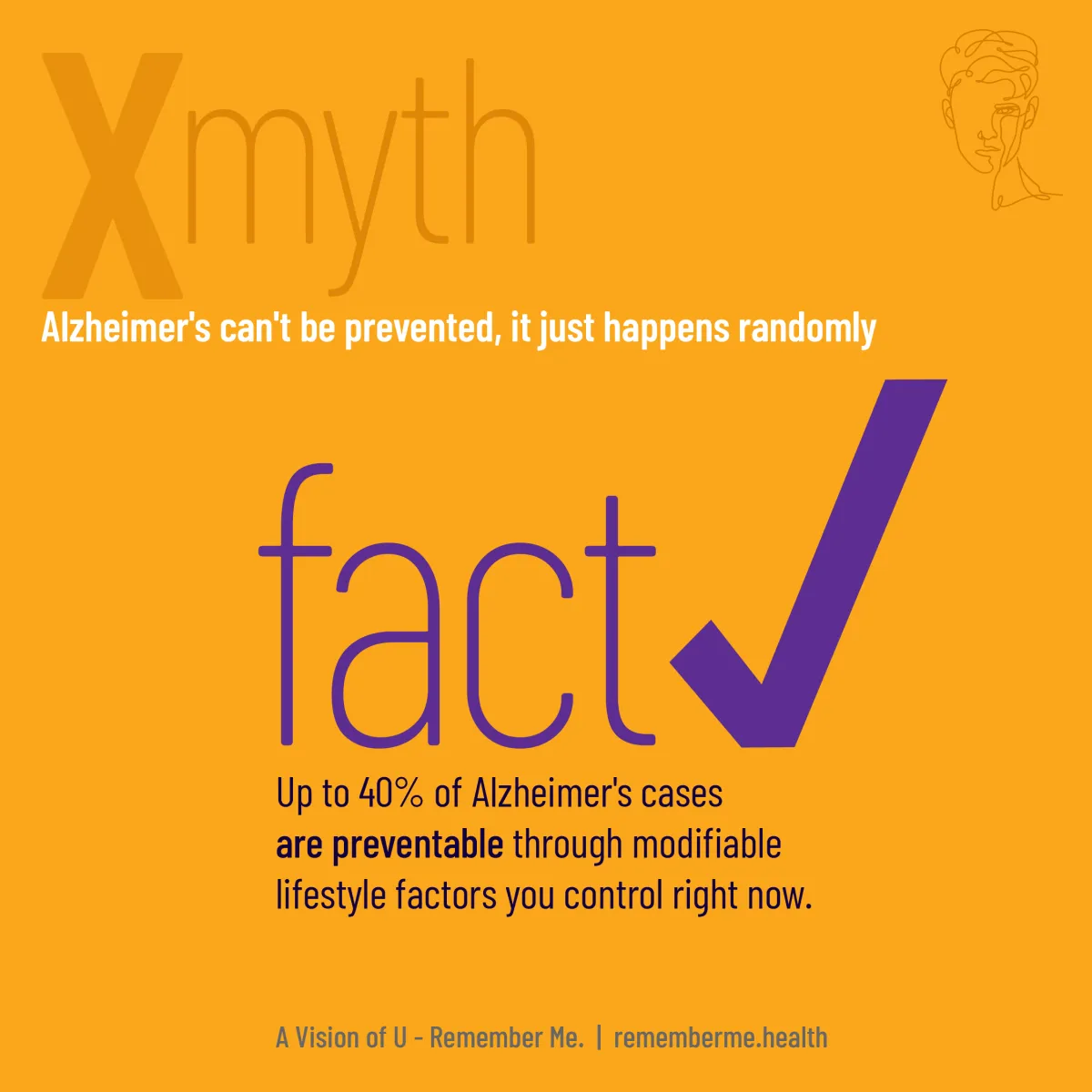
Myth: "Alzheimer's can't be prevented, it just happens randomly"
Fact: "Up to 40% of Alzheimer's cases are preventable through modifiable lifestyle factors you control right now."
"You'd rather believe Alzheimer's is random than admit your daily choices are creating your future."
Calling Alzheimer's "random" absolves you of responsibility. If it's random, you don't have to change anything. But the research is clear: diet, exercise, sleep, social connection, cognitive stimulation, and stress management significantly reduce risk. Your daily choices are votes for or against your cognitive future. Stop voting for decline.
What daily choice are you making that's voting FOR cognitive decline?
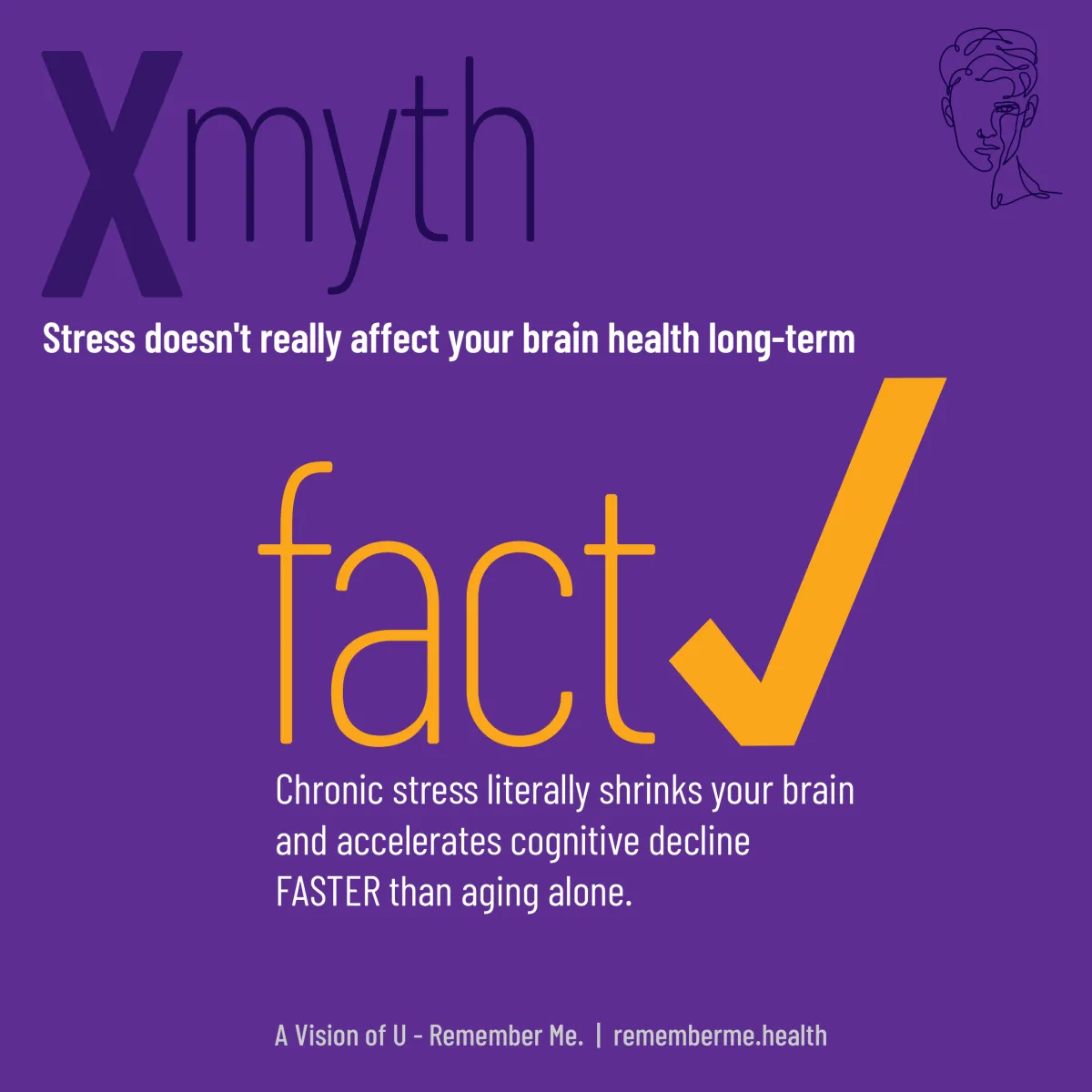
Myth: "Stress doesn't really affect your brain health long-term"
Fact: "Chronic stress literally shrinks your brain and accelerates cognitive decline faster than aging alone."
"You're stress-shrinking your brain while convincing yourself 'stress is just part of life.'"
Chronic stress floods your brain with cortisol, which kills neurons in your hippocampus (memory center). It disrupts sleep, impairs immune function, and creates inflammation. But you normalize stress because "everyone has it." Everyone having cancer doesn't make cancer healthy. Everyone having stress doesn't make brain damage acceptable.
What's your biggest source of chronic stress, and what are you actively doing to manage it? Not just "dealing with it" - managing it.
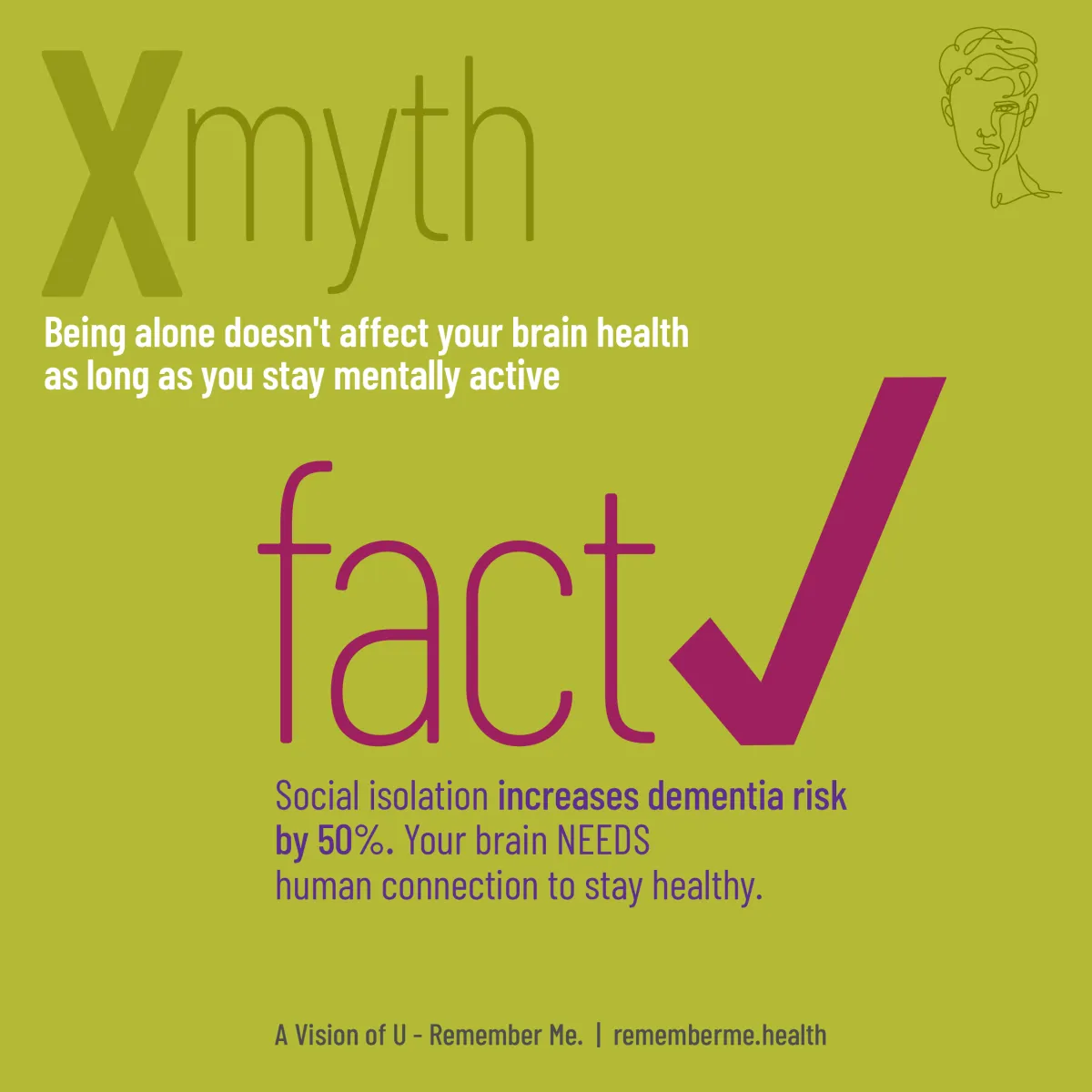
Myth: "Being alone doesn't affect your brain health as long as you stay mentally active"
Fact: "Social isolation increases dementia risk by 50%. Your brain needs human connection to stay healthy."
"You're intellectually stimulating yourself into cognitive decline by avoiding human connection."
You can do crossword puzzles alone all day, but without social interaction, your brain atrophies. Human connection activates multiple brain regions simultaneously - language, emotion, memory, social reasoning. Isolation is literally toxic to your brain. You can't puzzle your way out of loneliness-induced cognitive decline.
How many meaningful social interactions do you have weekly? And no, social media doesn't count.
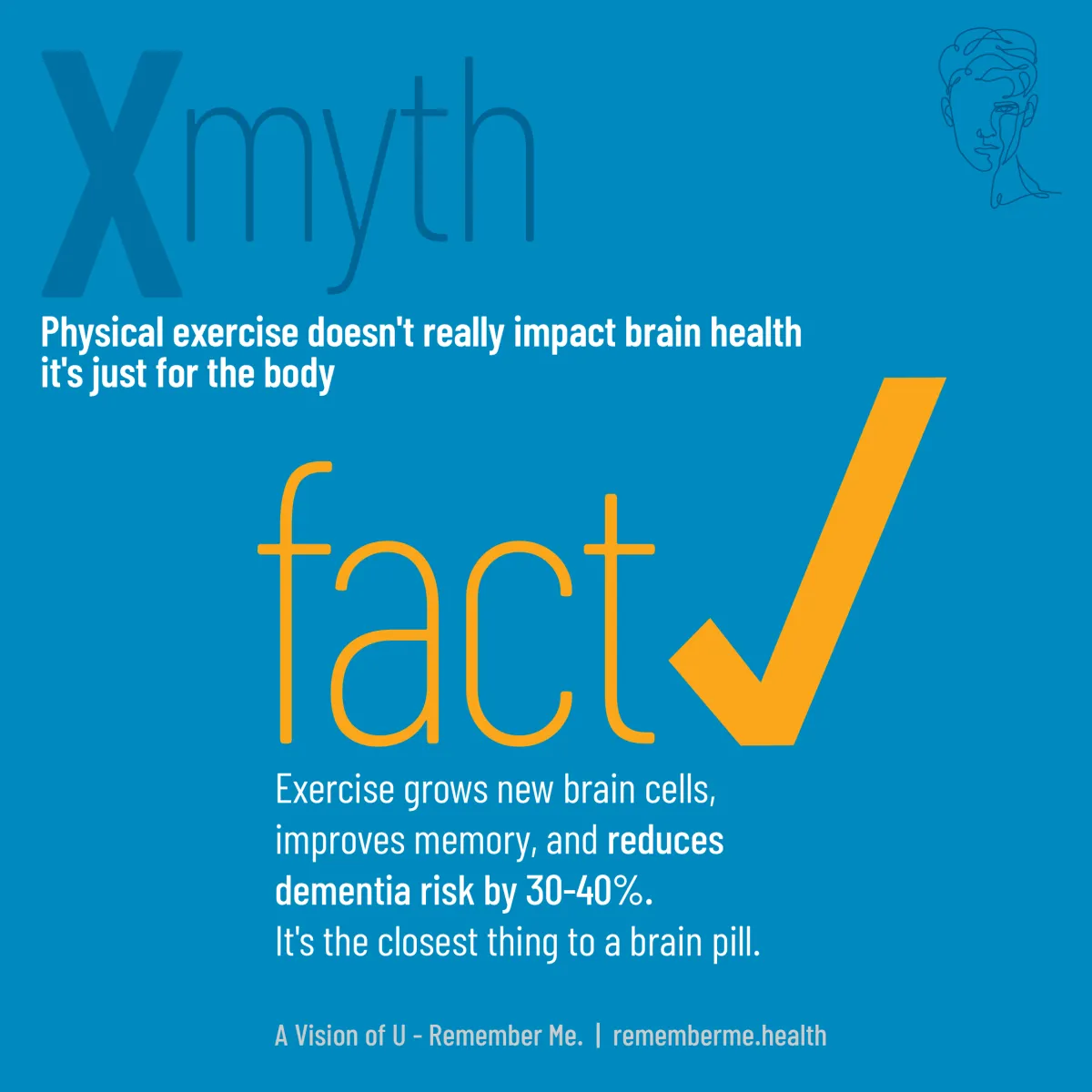
Myth: "Physical exercise doesn't really impact brain health - it's just for the body"
Fact:"Exercise grows new brain cells, improves memory, and reduces dementia risk by 30-40%. It's the closest thing to a brain pill.”
"You're ignoring the most powerful brain medication ever discovered because it requires effort."
Exercise increases BDNF (brain-derived neurotrophic factor), literally growing new neurons. It improves blood flow, reduces inflammation, and enhances sleep quality. Aerobic exercise is more effective than any pharmaceutical for brain health. But you'd rather take pills than move your body. The most powerful brain intervention is free, available now, and you're avoiding it.
When did you last exercise specifically for your brain health? Not weight loss, not fitness - for your brain.









This program is designed to complement medical care and is based on lifestyle interventions supported by current research. While 92% wait for pharmaceutical solutions, this course provides evidence-based tools you can use immediately. The information provided is not intended to diagnose, treat, cure or prevent any disease. Results may vary.
Privacy Policy | Terms & Conditions | © 2025 AVOU&Me LLC